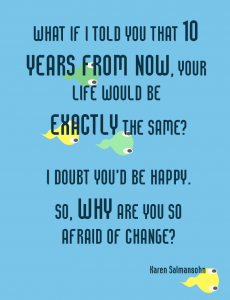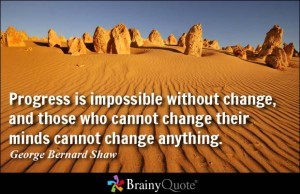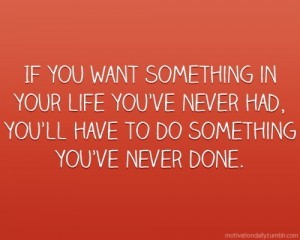The Courage to Change
I’m kicking off a new season of blog posts, on the subject of COURAGE. And I’d like to ask for your help. I’m embarking on a new book on this very subject, so I’m using these blogs to pilot my ideas. I’d love to get your feedback. Agree? Disagree? or “Yes, and…..”? Please tell me in the comments below!
“I must be willing to give up what I am in order to become what I will be.” – Einstein
 Change is hard. We all know that. If we’re overconfident, and tend to blame our circumstances rather than ourselves when things don’t go as we hoped, we might not accept that we need to change. And if we’re under-confident, and internalise blame, we might not fully believe that we are capable of change – if we try, and struggle, and fail, we might think to ourselves, “I’m useless – I’ve tried to change, and I can’t, and I never will”.
Change is hard. We all know that. If we’re overconfident, and tend to blame our circumstances rather than ourselves when things don’t go as we hoped, we might not accept that we need to change. And if we’re under-confident, and internalise blame, we might not fully believe that we are capable of change – if we try, and struggle, and fail, we might think to ourselves, “I’m useless – I’ve tried to change, and I can’t, and I never will”.
To change takes courage. A lot of it. And it takes different kinds of courage as we go through the process.
First, we need the courage to take a long hard look at what is happening in our lives, and take stock.
As Mark Twain said, “If you always do what you’ve always done, you’ll always get what you’ve always got”. So if what you keep on getting isn’t what you want, it’s time to get honest with yourself. Rather than wondering, “Why does this keep happening to me?”, try asking yourself, “Why do I keep creating this in my life?”. Take responsibility for it, and see how that changes things.
Second, we need the courage to commit to doing something differently, consistently over time, to see if we get a different result.
 This is a leap of faith. It may not be clear that the struggle to develop new habits is going to be worthwhile in the way you expect. The consolation is that whatever results you get will give you information. If you’re genuinely doing something differently, your results will be different – I promise you – and if they’re not the right kind of different, then reassess and try something else. The important part here is to commit to making the change, and follow through with it. Wholehearted commitment is the only effective option – nothing less will do. Which isn’t to say that you’ll never screw up. But when you do, get back on the horse and carry on riding.
This is a leap of faith. It may not be clear that the struggle to develop new habits is going to be worthwhile in the way you expect. The consolation is that whatever results you get will give you information. If you’re genuinely doing something differently, your results will be different – I promise you – and if they’re not the right kind of different, then reassess and try something else. The important part here is to commit to making the change, and follow through with it. Wholehearted commitment is the only effective option – nothing less will do. Which isn’t to say that you’ll never screw up. But when you do, get back on the horse and carry on riding.
Third, we need to be prepared for other people to not like the new version of ourselves.
They might be very comfortable with us being not too successful, or overweight, or addicted to doomed relationships. Maybe it reassures them that they are not the most inadequate person on the block. If you change, they may feel pricklings of guilt and envy because they don’t have as much courage as you do. This can be hard. They may well try to drag you back into the old you – “go on, just one cookie won’t hurt”. And if you love them, you may well feel bad that you’ve made them feel uncomfortable. Your urge to comply with their low expectations of you may be strong. But whose life is it? If you’re really committed to living your best life, hold steady. If they don’t love you enough to support your personal growth, you may want to reconsider whether they are someone you want to be around.
 Central to this is the idea of you taking ownership of the change.
Central to this is the idea of you taking ownership of the change.
You’re not trying to change your boss, or your spouse, or your children. You’re welcome to try, but trying to fix other people rarely works, and more usually leads to enormous frustration. You’re not even looking at what you can do about a challenging situation. You are looking at how you can be with it. To that end, I would tweak what Mark Twain said, to “If you carry on being who you’ve always been, you’ll always get what you’ve always got”.
So change.
That might sound hard. You might feel like you’ve always been the same person, and always will be, but trust me, you’re changing. If you look back to who you were at 10 years old, 20, 30, 40, 50, you can see that you have changed over time. Mostly, we are not conscious of how we are changing, because we spend all day, every day with ourselves. If you’ve ever gained (or lost, if you’re lucky) weight very gradually, you’ll know that the difference might be imperceptible to you until you run into someone you haven’t seen in a long while and you see the surprise on their face.
So we’re changing anyway.
Living a conscious life means making conscious changes – those incremental changes that, over time, add up to a dramatic transformation that is no less radical for having happened little by little, like a river carving a canyon or a stalactite forming in a cave.
Exercise:
 1. The next time you catch yourself thinking, “Why does this keep happening to me?”, stop for a moment. Make a mental note.
1. The next time you catch yourself thinking, “Why does this keep happening to me?”, stop for a moment. Make a mental note.
2. Now, change your attitude towards it. What if this recurring thing wasn’t happening to you, but rather happening for you? If your life were a gentle but persistent teacher that insisted on giving you this one lesson over and over until you got the message, what might that that message be?
3. What might the obstacles be to you taking that lesson on board? Who will be affected? How? What might make it difficult for you to make this change? Come up with a strategy. Figure out ways to overcome those obstacles. Plan ahead to make it as easy as possible for you to change in the ways you want to change.
4. Experiment with your theory. Try doing things a bit differently for a while. You don’t have to go in with all guns blazing in an act of radical personal transformation – although you can, of course. Up to you. But equally it can be a quiet (r)evolution, starting gently, with the “minimum viable response” approach. In other words, from a place of inner strength and serenity and self-containment, subtly modify the way you operate in the world and see if you start getting different results. If you do, are those results better or worse than what you got before? If they’re better, are they better enough? Adjust your strategy as you go, but always from that core of inner strength and serenity and self-containment.



